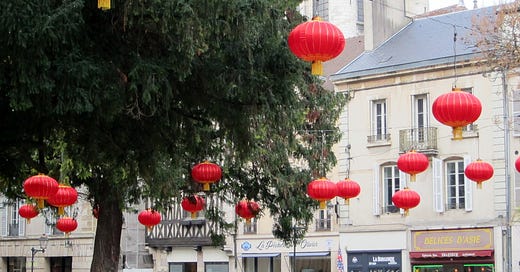Footnotes to a Conversation, December 16, 2024
“The highest tribute to the dead is not grief but gratitude.” – Thornton Wilder
Mining for European Art
We assume that changes in artistic style reflect cultural shifts and evolving ideas of what makes good art, but there may be another explanation. Changes in mining and manufacturing technology in the 16th and 17th centuries provided artists with new colours and techniques. For example, “miners helped revive the use of antimony, which had been used to make yellow glass and pottery glazes in ancient Egypt and in parts of Europe up until the fourth century. This pigment was rediscovered in the form of Naples yellow, an oxide of lead and antimony found in the mines. The pigment appeared in ceramics starting in the late fifteenth century and then in paintings starting in the early seventeenth.” [JSTOR Daily]
Pop Goes the Weasel
There are multiple versions to this childhood rhyme. The one I learned as a child was “Half a pound of tuppenny rice / Half a pound of treacle / That’s the way the money goes / Pop goes the weasel.” The first 3 lines make sense, but what do grocery purchases have to do with a small furry mammal? Perhaps not much. “Weasel here is probably operating as rhyming slang in which a weasel and stoat was a coat. To pop something, meanwhile, was to pawn it, and the rhyme proceeds to list all those items that can be bought with the cash exchanged for the coat”. [Word Perfect, Susie Dent]
A Linguistic Bubble
Far more people speak English in France today than was the case when I was there in 1976. There’s a tendency to view English as a universal language, but a multilingual European says, “The world has NOT adopted English as the lingua franca. The vast majority of 8 billion people out there do not speak it. And even those few who do, do not communicate with us really: they usually choose not to share their culture, values, intentions, or emotions in English … People from other ‘bubbles’ (cultures) know more about us than we know about them … It is our ignorance and arrogance that give us the illusion that we’ve made the civilization and that we drive it.” Do you agree – disagree? [Nomadic Mind]
A Winter Morning, Ted Kooser
I used to live in a rural part of the Interior of British Columbia and it was a long, dark drive home from shopping in Nelson. I was grateful for the farmhouse lights that broke the darkness.
“A farmhouse window far back from the highway
speaks to the darkness in a small sure voice.
Against this stillness, only a kettle’s whisper,
And against the starry cold, one small blue ring of flame.”
[At Home: A collection of poems selected by Janie Hextall & Barbara McNaught]
I’m taking a two-week break over the Christmas holidays. Footnotes to a Conversation will return on January 6, 2025.
Footnotes to a Conversation is a weekly Monday feature covering an assortment of topics that I’ve come across in the preceding week – books, art, travel, food, and whatever else strikes my fancy. I also post occasional articles on other dates, including frequent book reviews and travel tales.
If you share my love of nature, check out EcoFriendly West, an online publication encouraging environmental initiatives in Western Canada, and Nature Companion, a free nature app for Canada’s four western provinces.




